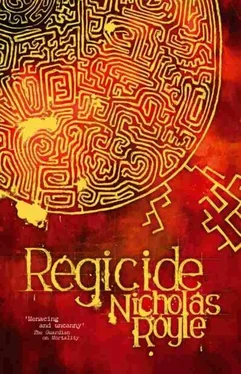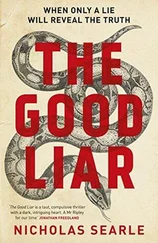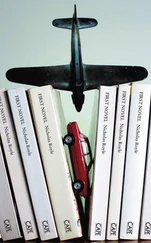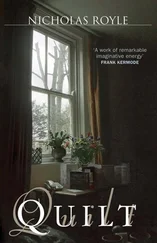I had to choose: left or right. It wasn’t quite fifty-fifty. My instinct said left because that way lay the stadium to which they had been taking me. Left would take me deep into the grey area where I would most likely find any sidings or depot. These wouldn’t be far from the stadium, because of the difficulties of transporting the executed men from the football ground to the railway line without any of them escaping. To some extent I was busking it, making assumptions based on comments made by Gledhill — when he had talked of maintaining a presence in the grey areas along railway lines and canals — and Maxi, who had referred specifically to the dead lying down only when the train passed over into my world.
She had been on my side at the end, when it mattered, so I had to trust her information.
I shivered in the raw night air. The oily canal water was still making me slip as I skipped from sleeper to sleeper. The line was built on relatively high ground and I could see the City’s lights spread out on the left. On the right lay darkness broken by a few scattered lamps. I was tempted to make off in that direction but resisted. I knew the City too well now to believe I might escape that way. The darkness would be thick with snares. I had come to understand that the City was everywhere and if you were inside the City looking out it stretched to infinity. If you were outside looking in, as I had been, it simply didn’t exist in physical terms at all. Somehow it was everywhere and nowhere at the same time, as Gledhill-the-patient had said of the Dark.
I noticed movement in the streets on my left. At least a mile away lights were gathering around a central point. Then, as I continued running, they started to disperse in all directions, thousands of lights. People carrying flaming torches perhaps. Presumably curfew had been cancelled and all loyal citizens sent out to hunt me down. The thought lent speed to my flight. Some of the lights were heading for points further up the line. I had no choice but to continue running, convinced now that this was my last chance.
When I hit the sidings the lights were still half a mile away, bobbing and converging as they narrowed the gap. I listened hard and heard what I wanted — the chug-chug of an engine ticking over. The smells of diesel and grease were sweet after the foul stench of the canal. Floodlights positioned at the corners of the depot meant I had to proceed with more caution, but the engine noise was easy to locate. I picked my way over the tracks, ducking beneath lines of idle rolling stock and freight wagons. The velvety darkness beyond the sidings was dotted with coloured signals. The train with the live engine which I was now approaching appeared to be waiting for a red signal to go green. The locomotive was painted grey and red.
The wagons were old cattle trucks with wooden, slatted walls. I stopped by one and pressed my ear to the side. All I could hear was the persistent chugging of the diesel. I peered in between two vertical slats and what I saw made me look away and double up to be sick over the oily chippings.
In the semi-darkness of the wagon I’d seen ceiling-filtered light from the high floods falling across bare dirty-white thighs and torn shoulders, twisted, wasted arms and shaved heads.
These were the dead. And they were standing up.
The idle of the locomotive took on a different, higher tone. I looked up the line, vomit still burning the inside of my mouth, and the light flicked to green. The locomotive revved and a great cloud of diesel exhaust billowed into the floodlit night. The trucks were jerked into life in a long domino line and I reached for the catch on the gate. At first it wouldn’t give and the loco gave its first real tug on the wagons. I had to jump and fiddle with the catch while walking sideways. Suddenly it fell open and I opened the gate just wide enough to squeeze in. I fastened it after me and stared out through the gaps in the truck wall at the receding lines of carriages and, jumping between them, the dancing flames of the late King’s loyal avengers.
As a deathly chill spread from my stomach to claim my extremities and my heart pumped faster than the clickety-clack of the trucks on the track, I turned to face my companions.
Their eyes were open. The light in the truck was poor — narrow shafts admitted by the gaps in the walls — but sufficient to allow me glimpses of terrible wounds, encrusted with blood now cold and dark. No one had told me what form of execution was preferred in the City but many of the injuries were consistent with my suspicion that suspects had been thrown into the football ground to fight for their lives with vicious dogs.
A man propped up not two feet from me had a ragged hole in his throat where a beast’s jaws had fastened and refused to let go. A short young man with a shock of blond curls and empty dark eyes had black puncture marks on his neck and chest. Either the accused were cast naked into the arena or the authorities stripped the bodies after the dogs had done their worst.
The train clattered on into the night, travelling distressingly slowly. I looked through a gap but couldn’t see anything beyond the hedges and trees and occasional lights at the edge of the track.
There was a pungent smell in the truck, which I had been trying to ignore. All I could think of was the bag of turnips I had once left undisturbed for months in the crisper drawer of my fridge. When I came across it I took hold of the top of the bag and pulled. The paper bag, weakened by the soggy decaying mess inside, broke and decomposed vegetables went everywhere.
It was the details — the shaving scar, the mole on one woman’s cheek, the pierced ears, dark roots amid dyed blonde hair — that affirmed the humanity of the train’s cargo. Otherwise they could be sides of meat destined to hang on hooks in the market. And yet, though dead, they remembered enough of life to remain standing.
As the train slithered across a set of points the truck rocked and a tall man with a long, crumbling nose and a bloody superficial labyrinth where his right ear had been fell against me. I recoiled but he came with me, the weight of several bodies pushing him from behind. We tumbled to the floor of the truck. Bodies slithered over the tops of ones that had already fallen and soon I was buried beneath them, trying to block my nose and avert my gaze. Even when I thought the landslide had stopped, another slight jolt from the train scythed a fresh crop.
Winded and bruised I tried to crawl out from under the corpses and it suddenly occurred to me that the train must have crossed over into our world. That was why they had all fallen over. At last they could rest in peace.
But I realised I was wrong when I felt a tickling on my ankle and tried to pull it away and couldn’t. One of the corpses was using it as a handhold and had started to climb up my body.
Another, a woman with a deep, sharp cleft in her face — the dull flesh of her cheek flapped loosely, exposing the glimmer of bone beneath, clearly not the work of pit bulls but that of a blade — approached me from my left. She crawled over the pile of bodies to get at me, clawing with her one good hand.
It dawned on me that I was the cause of these deaths. Or that was what the City would want me to think, anyway.
More of them found the energy to move, raising shaved heads that bore deep scratches from doing battle in the stadium, moving forward on elbows and stumps. Their desperate, vengeful hands reached out to my face, their broken, bone-splintered fingers cracking as they sought to put out my eyes, tear my flesh, as theirs had been.
I retreated into the corner, desperate to deflect their clumsy assaults. Still they came. As they hit me, some of them sacrificed their skin as it split from knuckle and joint like rotten fruit. The tall man with the crumbling nose had hauled himself up the length of my body and had his face next to mine. As weak blows landed on my legs and feet, this man opened his mouth as if to kiss out my life. His teeth were still good but his gums were rotting, his mouth having become a still-warm nest for fat white maggots, and the foul stench almost overpowered me. I was sick again, spitting bile at the man’s face, into his glassy eyes.
Читать дальше












